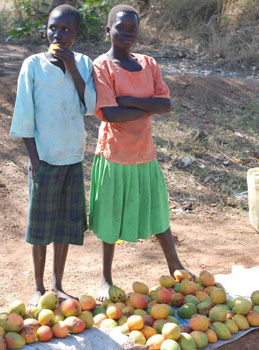
YEI, Central Equatoria State, Southern Sudan – Uprooted remnants of mango trees, leaves gone, trunks chopped up and collecting dust along the main road through town. The story of Yei’s mango trees preceded our visit. “The mango trees were Yei’s defining feature,” we were told. “I can’t imagine Yei without the mango trees,” said a friend originally from Yei, who like us until now, had heard conflicting rumors about why Yei’s beloved trees had been cut down.
The one government official we asked about the mango tree controversy dismissed it as a sign of the changing times, a positive indication of what’s to come in southern Sudan. He explained to us that clearing the trees makes room to expand the main road through Yei that runs to Uganda.
With national elections just three months away, the highly-anticipated vote on southern independence a year from now, and criticism mounting over the South’s ruling SPLM party’s ability to deliver to its people, there’s an evident push by southern leaders to find quick public victories. What better way to show the community that change is afoot than by improving a town’s main thoroughfare? But the idea backfired.
In a strange sort of way, it was almost reassuring to hear people complaining about the trees. Compared to the grievances one typically hears when talking to people about their lives and their fears for the future in southern Sudan, the mango tree controversy seemed more like a public relations problem for the local government than anything else.
Life in Yei is calm. There are lingering tensions over property – the SPLA had its headquarters in Yei during the North-South civil war and had free reign over property then that original owners now want back – but the foundations of the society are strong, as we heard from a number of people we spoke to. “Many people turned out to register to vote, especially women,” one local aid worker reported. “People here are educated,” said Mr. Bebe, headmaster of Yei Day Secondary School (read more about Mr. Bebe and his school in a post tomorrow).
“We are far from any enlightenment center,” Mr. Bebe said, “but we have hope that we can govern ourselves.” This cautious hope certainly resonates with many of Mr. Bebe’s fellow southerners, but it feels a little more in reach in this bustling town on the road to Uganda.

